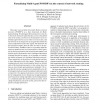Free Online Productivity Tools
i2Speak
i2Symbol
i2OCR
iTex2Img
iWeb2Print
iWeb2Shot
i2Type
iPdf2Split
iPdf2Merge
i2Bopomofo
i2Arabic
i2Style
i2Image
i2PDF
iLatex2Rtf
Sci2ools
146
Voted
HICSS
2003
IEEE
2003
IEEE
Formalizing Multi-Agent POMDP's in the context of network routing
This paper uses partially observable Markov decision processes (POMDP’s) as a basic framework for MultiAgent planning. We distinguish three perspectives: first one is that of an omniscient agent that has access to the global state of the system, second one is the perspective of an individual agent that has access only to its local state, and the third one is the perspective of an agent that models the states of information of the other agents. We detail how the first perspective differs from the other two due to the partial observability. POMDP’s allow us to formally define the notion of optimal actions in each perspective, and to quantify the loss of performance due to partial observability, and possible gain in performance due to intelligent information exchange between the agents. As an example we consider the domain of agents in a distributed information network. There, agents have to decide how to route packets and how to share information with other agents. Though almost ...
Biometrics | HICSS 2003 | Partial Observability | Routing Protocol | System Sciences | first Perspective Differs |
Related Content
| Added | 04 Jul 2010 |
| Updated | 04 Jul 2010 |
| Type | Conference |
| Year | 2003 |
| Where | HICSS |
| Authors | Bharaneedharan Rathnasabapathy, Piotr J. Gmytrasiewicz |
Comments (0)

